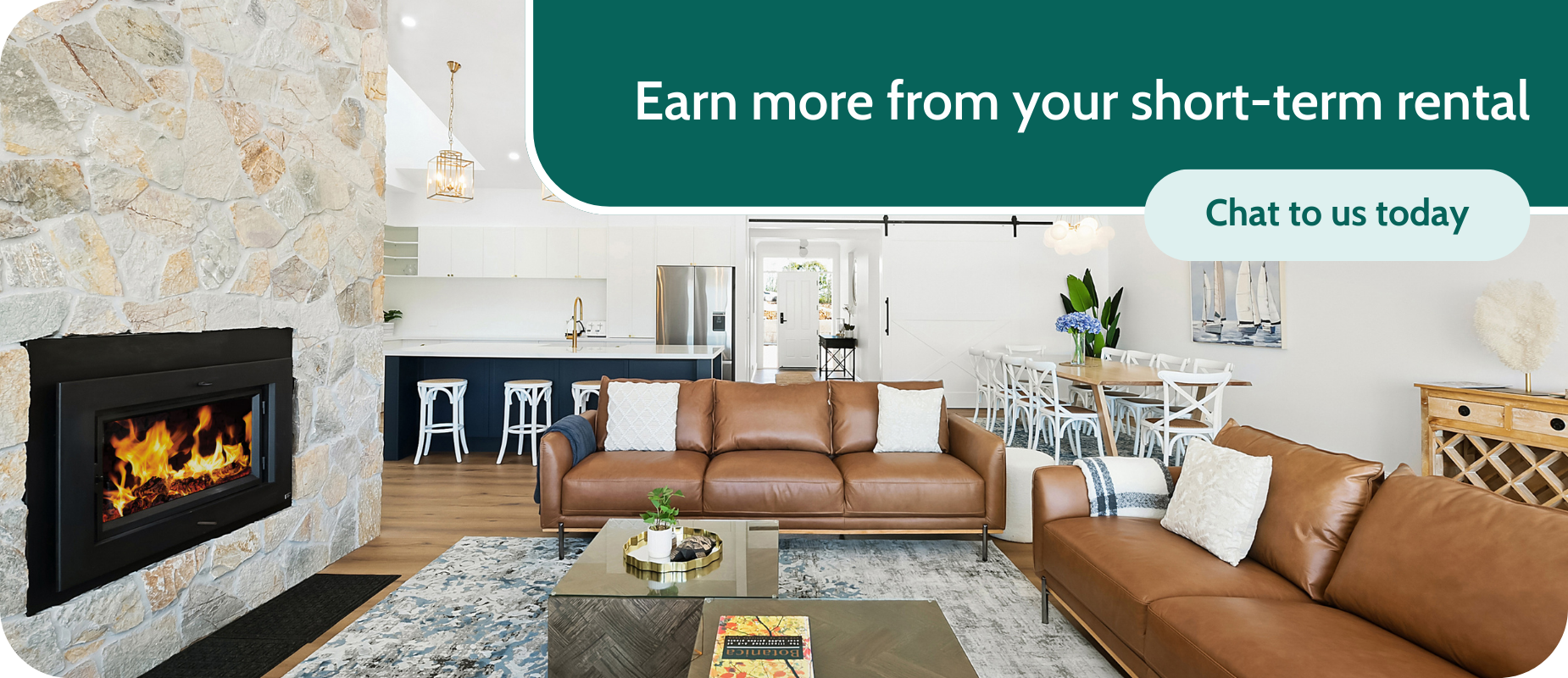Third-party tools to estimate your Airbnb's potential earnings can be useful for planning, but their one-size-fits-all approach can be hit-or-miss. For an accurate estimate, consult property management experts like Hometime who can give you a more accurate estimate based on factors like property type, size, and benchmarking using both internal and external data. You'll also get both a conservative and a high-performance estimate to show the minimum and maximum amounts you can earn.
Why promises of higher Airbnb revenue projections aren’t always true

When you're comparing Airbnb managers, it’s tempting to go with the one promising the highest earnings. We get it, income matters. But here’s the thing — those numbers can be misleading. In this blog, we’ll tell you all you need to know when conducting an Airbnb management income comparison.
When comparing short-term rental (STR) managers, projected Airbnb potential earnings can be a significant motivator for your decision. Most STR management companies use Airbnb revenue projections as a tool to win over your business. They quote a big number upfront, often pulled from generalised tools or market-wide averages. These figures look good on paper, but they rarely reflect your property’s real-world performance.
At Hometime, we don’t believe in smoke and mirrors. We believe in long-term, sustainable earnings based on transparent data, not inflated promises. Let’s unpack how STR revenue projections work and what you should watch out for.
A closer look at third-party Airbnb revenue projection tools
STR earnings estimates are everywhere. Most property managers offer potential earnings for Airbnb, but few explain how they’re built. Here’s the truth — many estimates rely on external third-party property management tools like AirDNA, PriceLabs, and Avantio. AirDNA scrapes data from over 10 million properties across 120,000 global markets. With over 1.3 million users, this tool is relied upon by many property managers to provide the average Airbnb host earnings in Australia. Meanwhile, PriceLabs prices over 500,000 properties daily, and Avantio is used in 47 countries.
In large, well-established markets, these third-party tools can provide fairly accurate insights to help paint the big picture, but lack a more nuanced approach that considers your property characteristics or more in-depth local knowledge.
Third-party tools can be useful for predicting your average Airbnb income in Australia. However, their one-size-fits-all approach can be limiting when not carefully assessed by property management experts. Some companies quote from these third-party tools directly, without scrutiny, to make their offers seem more impressive.
It’s not uncommon for managers to:
- inflate projections with peak-season numbers,
- exclude platform or Airbnb management fees, and
- skip over seasonal dips and maintenance gaps.
Why? Because they’re trying to win you over quickly. But what good is a projection if it doesn’t hold up?
More data isn’t always better — it just creates the illusion of sophistication. What matters is the quality of the data and the rigour behind how it’s applied.
What to ask yourself before you trust the numbers
If you’re comparing property managers and Airbnb revenue projections, don’t just take their numbers at face value. Ask yourself:
- What data source was used to generate the Airbnb income potential?
- Does it reflect gross or net earnings?
- Have cleaning fees, cancellations, or gaps in availability been factored in?
- What occupancy rate does this estimate assume?
- Is this based on a similar property in the same suburb, or just broad averages?
A credible provider should be able to walk you through their assumptions. If they can’t — or if they say things like “we usually beat these numbers anyway” — it’s a red flag.
Here’s another smart one: “How did a comparable property perform last year with your team?”
This question brings the conversation from the theoretical to the real. It puts performance, not projections, front and centre.
At the end of the day, the best revenue managers don’t just generate numbers — they own your property’s performance week to week.
For more information on how to find someone to manage your property, check out our blog on the five questions to ask when choosing an Airbnb manager. You can also book a chat with our helpful team at Hometime for a fair and accurate estimate of your Airbnb ROI:
_1.webp)
What to look for in a trustworthy short-term rental manager
A reliable short-term rental manager is invested in helping you earn more, not just feel good about a big number on a page.
That starts with how they predict Airbnb income. It’s not a sales shortcut. It should be a detailed process, including:
- Property review
An onsite property inspection is conducted, where the property manager should:- take photos and videos to document the condition of your property,
- note down key Airbnb amenities, such as air-conditioning, scenic views, balcony, onsite parking, and outdoor spaces,
- determine the fit-out quality, size, styling, and layout of your property,
- scope out location-specific appeals, such as its proximity to public transport and shops, nearby restaurants, and attractions.
- Internal data
A reliable property manager doesn’t just rely on third-party tools — rather, they draw from real, live performance data across thousands of short-term rental listings in Australia. At Hometime, our earnings estimates are drawn from:- access to live performance data across our portfolio in similar suburbs,
- use of internal dashboards and tools to analyse occupancy, average daily rate (ADR), revenue per available room (RevPAR), and seasonality,
- competitive set (comp set) analysis on direct competitor properties with similar features to your listing, e.g., similar size and location, and
- comparison of forecasted vs. actual performance to refine our estimates.
- External benchmarking
You should look for a property manager that combines third-party tools with internal data to leverage market-wide and property-specific insights. Property managers should not solely rely on these platforms. Instead, these platforms provide the intel to help property managers validate assumptions, guide strategy, and anchor pricing recommendations in real-time data. At Hometime, we combine the following external tools with our internal data:- AirDNA: Demand patterns, average daily rate (ADR), occupancy rates, seasonality, and revenue potential across suburbs
- PriceLabs: Discover live pricing trends, conduct competitive set (comp set) analysis on similar properties (filtered by size, location, and amenities), pacing data to track how many stays you’re getting, and Market Dashboards
- Final estimate
Your property manager should provide you with a net revenue estimate based on in-depth internal and external analysis, exclusive of management and platform fees. At Hometime, you’ll get both a conservative view and a high-performance potential view.
And behind it all is a real human — a dedicated revenue analyst who monitors your property’s performance and adjusts pricing weekly. This isn’t guesswork. It’s a real revenue strategy, backed by data and people who care.
Check out this video from Shaun Craike, Hometime's Head of Sales, to know more about how Hometime combines both internal and external data factors to come up with the best and most accurate Airbnb earnings estimates in the industry:
Don’t fall for the highest number
Bold revenue claims might feel exciting, but they can come at a cost.
The difference between a flashy estimate and consistent performance in a short-term rental’s ROI is accuracy, transparency, and accountability. Most companies inflate numbers to win your business. A good sign is a manager who focuses on building trust and delivering on what they say.
So if you’re comparing Airbnb managers, you should:
- Ask better questions.
- Look for clarity.
- Ask about the process.
- Find out who’s responsible for helping you earn more once the contract is signed.
At Hometime, we won’t promise the most. We’ll help you earn the most — the right way.
Learn your property’s potential with Hometime
Hometime is proud to be an Australian-owned and operated business since 2016, hosting more than one million guests across Australia. You can count on our property management experts to take a holistic approach to determine your Airbnb earning potential. Our priority is to remain transparent and deliver on our promise rather than swaying you with big numbers and no results. We also offer a comprehensive range of services, including:
- property styling and photography,
- listing optimisation,
- cleaning services,
- revenue and booking management,
- guest management,
- property maintenance, and
- access to Hometime's all-in-one property management software.
Learn more about our Airbnb management services in Australia and get an earnings estimate by scheduling an obligation-free chat with us below:

Amenities
Lorem ipsum dolor sit amet consectetur. Gravida elementum dolor semper felis pulvinar feugiat risus adipiscing dictum. Ultricies nec elementum nisi ut. Cras diam odio sed auctor pellentesque. Sit nisl ipsum id convallis tristique. Malesuada.
Frequently Asked Questions

If you’re wondering how to calculate Airbnb income, start by looking beyond general market averages and ask for a tailored earnings estimate based on your specific property’s features, location, and availability. Many managers rely on tools like AirDNA that use broad assumptions, which can lead to inflated projections. Instead, choose a provider that uses both internal performance data and filtered third-party insights, sense-checks the results, and factors in occupancy, fees, and seasonality. The most reliable estimates come from a transparent process backed by real data — not sales hype. To get an estimate, reach out to Hometime today.

Yes, Airbnb can be profitable in Australia — but profitability depends on factors like property location, quality, availability, and how well it’s managed. Top-performing listings are often styled well, priced dynamically, and consistently maintained to attract high-quality guests. However, to understand the average Airbnb host earnings in Australia, homeowners need realistic revenue estimates based on net income (after fees and costs), not inflated projections. Profitability comes from sustainable performance, not just big promises.








